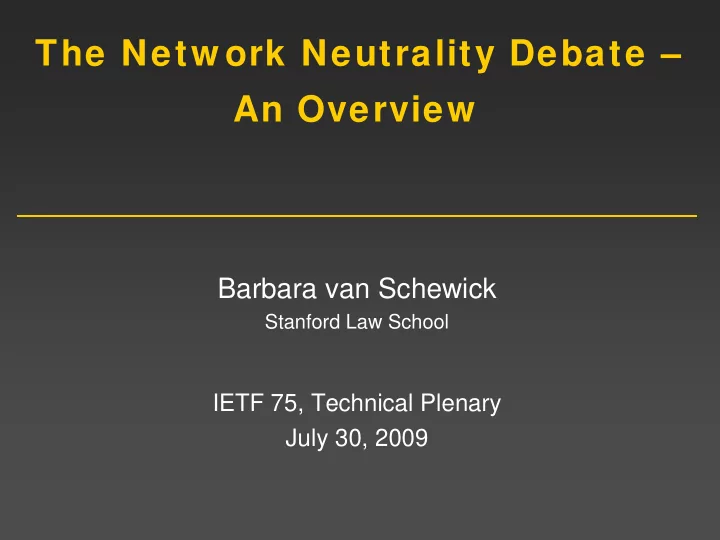

The Netw ork Neutrality Debate – An Overview Barbara van Schewick Stanford Law School IETF 75, Technical Plenary July 30, 2009
What is netw ork neutrality? 2
What is netw ork neutrality? Technology enables network providers to control applications and content 3
Goals of the Talk • Framework for understanding the debate 4
Goals of the Talk • Framework for understanding the debate • Overview of main positions and arguments 5
Goals of the Talk • Framework for understanding the debate • Overview of main positions and arguments • Relevance for IETF • Impact of potential rules on IETF standards • Potential new work 6
Framew ork I . Proposed Rule 1. Blocking 2. Discrimination a. QoS b. Charging for QoS I I . Proposed Exceptions 1. Security 2. Congestion Management 7
A rule against blocking is at the core of all netw ork neutrality proposals ... • ... may be framed as user rights ... 8
A rule against blocking is at the core of all netw ork neutrality proposals ... FCC Internet Policy Statement, 2005 • "... consumers are entitled to access the lawful Internet content of their choice.“ • "... consumers are entitled to run applications and use services of their choice, subject to the needs of law enforcement.“ • "... consumers are entitled to connect their choice of legal devices that do not harm the network." 9
Scope • Network neutrality rules only protect against blocking • of legal content and applications • driven by network providers‘ interests • Network neutrality debate does not address • proper treatment of illegal content or applications • interference with users‘ Internet use driven by the state 10
Do netw ork providers have an incentive to block? I 11
Do netw ork providers have an incentive to block? • Not always ... 12
Do netw ork providers have an incentive to block? • Not always ... • ... but more often than you would expect: • to increase their profits 13
Do netw ork providers have an incentive to block? • Not always ... • ... but more often than you would expect: • to increase their profits • to exclude unwanted content 14
Do netw ork providers have an incentive to block? • Not always ... • ... but more often than you would expect: • to increase their profits • to exclude unwanted content • to manage bandwidth on their networks 15
If there is an incentive, should regulators care? 16
If there is an incentive, should regulators care? Network neutrality proponents: • Impact on application and content developers • Impact on users • Application innovation/competition, free speech 17
If there is an incentive, should regulators care? Network neutrality opponents: • Only anticompetitive behavior • Role as editors • Need to manage networks • Competition solves the problem 18
If there is an incentive, should regulators care? • ... or „is the Internet different?“ 19
What is the role of competition? • ... or: „are there alternatives to regulation?“ 20
Framew ork I . Proposed Rule 1. Blocking 2. Discrimination a. QoS b. Charging for QoS I I . Proposed Exceptions 1. Security 2. Congestion Management 21
Does the proposed rule prohibit „discrimination“? 22
How does the proposed rule define „non-discrimination“? • ... or „does the proposed rule prevent QoS?“ 23
How does the proposed rule define „non-discrimination“? • treat every packet the same • treat classes of applications the same • users choose QoS, network provides QoS 24
If netw ork providers can offer QoS, w hom are they allow ed to charge for it? • ... or „to what extent does the proposed rule restrict network providers‘ business models?“ 25
If netw ork providers can offer QoS, w hom are they allow ed to charge for it? • nobody • only their own access customers • access customers and application/content developers (but needs to be non-discriminatory) • whomever they want to 26
Framew ork I . Proposed Rule 1. Blocking 2. Discrimination a. QoS b. Charging for QoS I I . Proposed Exceptions 1. Security 2. Congestion Management 27
Does the proposed rule allow blocking/discrimination for security? • e.g., denial of service attacks, viruses, spam 28
Does the proposed rule allow blocking/ discrimination during times of congestion? • ... or „to what extent does proposed rule restrict network providers‘ ability to manage congestion?“ 29
Does the proposed rule allow blocking/ discrimination during times of congestion? • any congestion management is fine • any congestion management is fine, as long as it is disclosed • congestion management needs to be non-discriminatory, if possible • single out specific applications (clearly not o.k) • single out classes of applications (may be o.k.) • give users choice of prioritization (clearly o.k.) 30
Trade-Offs Investment Incentives Network Innovation Costs of Regulation vs. Application Innovation User Control Internet’s Ability to Realize its Economic, Social, Cultural and Political Potential 31
Conclusion • Framework • Potential impact on IETF standards • Regulation vs. competition plus disclosure • Non-discrimination and user choice 32
Questions? Comments? schew ick@ stanford.edu 33
Recommend
More recommend